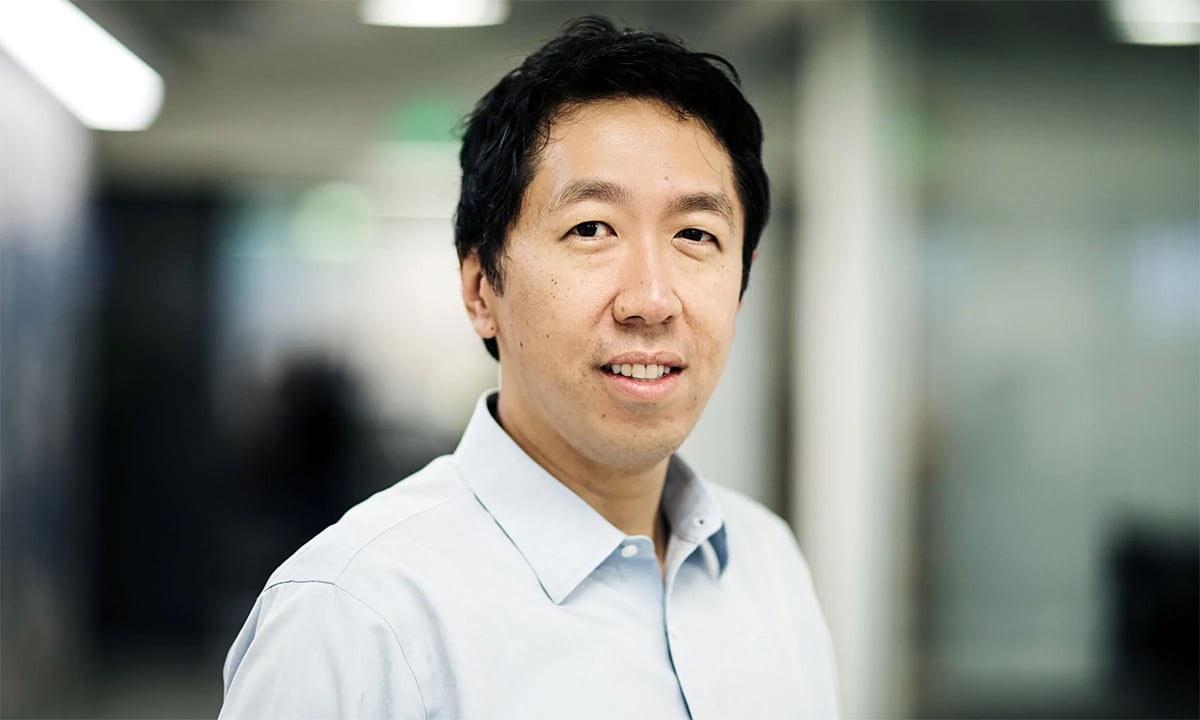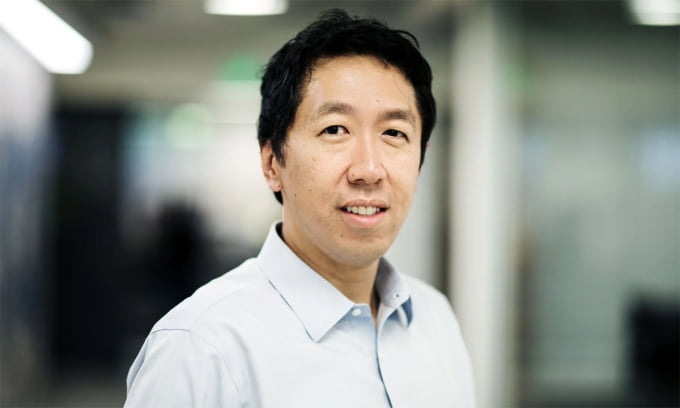
Andrew Ng was among the Top 100 global AI influencers voted by Time last month. He is also one of the founders of Google Brain, one of the most innovative and influential groups in AI development in the past decade.
Professor Andrew Ng is known as an “AI genius” not only for his vision of technology but also for his contributions in bringing AI into different areas of life, from education to manufacturing. He also contributes to popularizing AI through free courses from Coursera and online education company DeepLearning.AI. “Currently the world population is about 8 billion people. On average, one in every 1,000 people takes an AI course from me,” Andrew Ng told Time .

Professor Andrew Ng. Photo: Coursera
AI dream
Andrew Ng often appears at scientific conferences and talks about AI but rarely mentions his personal life. He was born in 1976 in England, grew up in Hong Kong and Singapore, then studied in the US and became a Computer Science lecturer at Stanford University.
He wrote on the Google blog in a rare time talking about his childhood: “I started learning to code at the age of 6. When I was a high school student in Singapore, I worked as an assistant in the school office. I remember having to photocopy a lot of documents. Since childhood, I wished I could create something that would automate all the photocopying work so I could have time to do other more meaningful work. At that time, artificial intelligence in my vision was automation. Automation. To date, most of my work in AI has also been about automating various tasks.”
Andrew Ng was born and raised in a technology environment as his father is a medical doctor but also researches AI into disease diagnosis. This was the fate that brought him to artificial neural networks when he was a teenager.
His AI dream began to take shape when he taught machine learning technology at Stanford University. “I found myself repeating lectures year after year, in the same room, even telling the same jokes,” Andrew Ng said about the reason for building Coursera – a mass online learning platform ( MOOC) is the world’s largest.
In August 2011, he posted a free machine learning video on YouTube and suddenly received great support from the community. His account attracted 100,000 registrations. This was the premise for him to start Coursera in 2012. Currently, Coursera cooperates with 62 of the world’s leading universities, providing more than 300 free online courses to millions of students.
Andrew Ng said with the above figure, Coursera would be a “money-making machine” if he only charged $5 per person. “For me and many people, 5 USD is only worth a cup of coffee. But for many poor children in India or Africa, this number is far beyond their ability to pay, they don’t even have a credit card to pay. payment. Building barriers to prevent them from accessing good online courses would be a tragedy. On the contrary, the more people AI tools are put into the hands of, the more it will develop,” Andrew Ng said about the philosophy do your education.
“Google cat” and the AI journey
In 2011, while a professor at Stanford University, Andrew Ng and Jeff Dean and Le Quoc – two experts from Google’s secret laboratory – created a system that simulates the brain of newborn babies. From 16,000 processing cores in 1,000 interconnected computers, the system can recognize human and cat faces with high accuracy.
“We do not feed any information about cats to the system. This model ‘watches’ YouTube videos and maps images to identify cats. Over time, the artificial brain begins to formed a preliminary concept of cats through data on shape, size, and color,” The Verge quoted the research team at the time.
“Google Cat” resonated in the research community and laid an important foundation for the company’s future services. Following the above research, Andrew Ng’s official business application at Google is to help the team develop more accurate speech recognition technology. After that, his team continued to put AI into Google Maps to locate locations, read house numbers on the map…
In May 2014, Andrew Ng left Google, stepping back to the position of co-chairman of the Coursera board of directors, before joining Baidu. He spent three years leading the AI research department of the Chinese technology giant.
He said on Technology Review : “After leading the AI teams at Google and Baidu, I realized AI has changed user behavior on the Internet, from web searches to online advertising approaches. But as That’s not enough, I want to bring AI into all other industries, which play an even bigger role in the economy.”
That’s why he founded Landing AI in 2017, helping businesses develop AI systems with not too much investment in code. Landing AI’s current customers include large manufacturing companies such as StanleyBlack & Decker, Foxconn and Denso. In May 2022, FPT Software cooperated with Landing AI to develop a smart image inspection solution package in factories.
Perspectives on the future of AI
“After laying the groundwork for the AI boom, the 47-year-old now spends his time trying to accelerate the benefits of AI. He does this by training as many people as possible in the field of AI , through projects like DeepLearning.AI and Coursera,” Time commented.
Andrew Ng became an evangelist for the “data-centric AI” movement, arguing that the biggest difference between AI businesses is how they use data to train artificial intelligence. He believes that a business can only truly “succeed in converting to AI” when they use as little data as possible to train the machine learning model, rather than pouring huge amounts of data into machine learning, which cannot be done. clean, streamlined.
Answering the question of whether AI is dangerous to humanity, the founder of Coursera repeatedly affirmed that technological progress always brings more benefits to humans. “There seems to be a negative correlation between the level of knowledge about AI and the level of fear a person has of it,” Fast Company quoted Andrew Ng as saying.
Another point of view of the founder of DeepLearning.AI is to give free access to technology to everyone. “The only way to build AI is to empower everyone in the world to use the tool. How can we put personalized tutoring in every child’s pocket? How can we get personalized health care for everyone?” How do we make sure everyone gets good legal advice? AI could be the answer,” Time quoted Andrew Ng as saying.
He is realizing this AI dream by building and funding AI applications through investment funds, startup projects and appearing at technology events to spread the vision. During that journey, he will come to Vietnam to talk about new opportunities for AI at the FPT Techday Technology Forum on October 24 in Hanoi.
Khuong Nha

Leave a Reply
You must be logged in to post a comment.